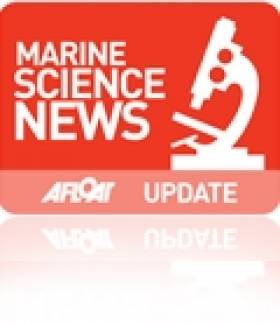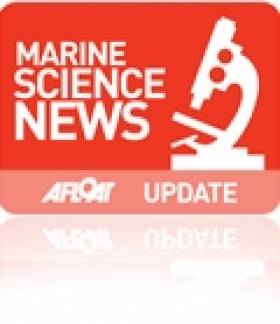Displaying items by tag: Dr Peter Heffernan, CEO Marine Institute
Marine Sector is Key to Ireland's Future Says President
Marine scientists yesterday welcomed President Mary McAleese on a visit to the Marine Institute headquarters in Oranmore, Co Galway.
The President met many of those involved in the SmartBay project, a network of buoys that uses remote sensing technology to collect and relay data on ocean conditions over long distances.
Institute staff also briefed the President on its programmes to sustainably manage wild fish stocks, ensure seafood safety and protect the marine environment.
“As the resources of the ocean become ever more implicated in the future development of high technologies sectors like energy, ICT, medical and pharma, they will be a key part of Ireland’s future economic story,” said the President.
Dr Peter Heffernan, CEO of the Marine Institute, also highlighted "Ireland’s reputation as an emerging centre of excellence in marine science".
He said this was "validated" by the announcement of €23 million in EU funding for marine research groups and enterprises involved in pioneering areas such as ocean energy and biotechnology.
EurOcean 2010 Calls for a "Blue" Future for Europe
Over 400 marine scientists and science policy makers, from across Europe, gathered at the EurOCEAN 2010 Conference (Ostend: 12-13 October) to highlight the critical role of the seas and oceans in the earth and climate system and as an important source of wealth and job creation for Europe. In calling for recognition of the Seas and Oceans as a Grand Challenge for Europe in the 21st Century, the European marine and maritime research community pledged its significant knowledge-base and specialized research infrastructures, to work in close cooperation with the public and private sector, to realize this ambitious goal.
EU Commissioner for Research, Innovation and Science Máire Geoghegan-Quinn, welcomed the Ostend Declaration "as an impetus for new ideas to boost marine research to innovate and address the challenges represented by our seas and oceans". She also pointed that "achieving the 3% target of EU GDP dedicated to research could create up to 3.7 million new jobs and €800 billion in additional GDP by 2025". "Marine and maritime research and technologies", she said "could contribute to such a process keeping in mind that "tomorrow's innovation starts with today's blue skies research."
Opening the EurOCEAN 2010 Conference, EU Commissioner for Maritime Affairs and Fisheries, Maria Damanaki, highlighted the potential of marine innovation saying that: "New growth can be Blue Growth and new jobs can be Blue Jobs. To create knowledge we need the marine community to continue making ocean measurements."
The two-day EurOCEAN 2010 Belgian-EU Presidency Conference brought together the European marine and maritime community to hear high-level speakers present a state-of-the-art overview of the exciting and innovative developments in marine and maritime research and technology which could transform the European Union into a blue economy. Topics covered included: sustainable seafood harvest, opportunities from marine biotechnology and blue energy; maritime transport and human health. Environmental and conservation challenges, such as climate change and marine biodiversity, as well as governance issues such as maritime spatial planning and the importance of international co-operation to tackle global and regional challenges were also addressed.
Dr Peter Heffernan, CEO Marine Institute and host of the EurOCEAN 2004 (Galway) Conference, in a keynote introductory address, traced the road from Galway in 2004 (Galway Declaration) to Ostend in 2010. He emphasized the various milestones and successes along the way, including the inclusion of marine science and technology as a pillar of the Integrated Maritime Policy for the Union (2007), the European Strategy for Marine and Maritime Research (2008) and the inclusion of marine science and technology as a priority cross-cutting theme in the 7th Framework Programme (2007-2013). Important lessons learned on this journey included: the need to link research priorities with current Community policies; a clear identification and quantification of the economic and societal benefits arising from marine research and the better communication of research outputs in a useful and usable format.
"Our challenge," said Dr. Heffernan, "is to move forward into the innovation space where the marine science community participates in the identification of societal changes, the anticipation of market demands and opportunities, and supports the innovation engine to be successful in commercialising such opportunities."
A second Irish speaker, Geoffrey O'Sullivan, Marine Institute - International Co-operation Programme and a Vice-chair of the Marine Board-ESF, in a presentation titled: Emerging Technologies ... Converging on the Oceans, highlighted to some of the exciting new developments and technologies emerging across the science and technology sector in renewable ocean energy, blue biotechnology, ecogenomics, nanoscience and ICT, which could and were being harnessed to support and catalyse new developments in the marine sector.
Adopting the Ostend Declaration, Lars Horn, Research Council of Norway and Chair of the Marine Board-ESF, stressed the pledge of the European marine and maritime research communities in the Ostend Declaration to work together with public and private stakeholders, and to mobilise its considerable knowledge-base and specialized infrastructures to realize the full potential health and wealth of the European seas and oceans – in other words: a Blue Future for Europe.
The Ostend EurOCEAN 2010 Conference and Declaration builds on the success of earlier Conferences in Aberdeen (2007) and Galway (2004) and was organised as a Belgian EU Presidency event in close cooperation with the European Commission and the Marine Board-ESF.
According to the latest Marine Board Vision Document, Marine Renewable Energy, Europe could source up to 50% of its electricity needs from renewable ocean energy, principally offshore wind, wave and tidal energy, by 2050. This would have a profound impact on the European economy and European citizens, contributing to energy security, reduction of CO2 emissions, improving the quality of the environment and heralding a new era of indigenous development, innovation and job creation in Europe.
The Marine Renewable Energy Vision Document was presented to Manuela Soares, European Commission, DG Research – Environment by Dr Marc Le Boulluec (Ifremer), Chair of the Vision Working Group. Mr Eoin Sweeney, representing Sustainable Energy Authority of Ireland (SEAI) and Geoffrey O'Sullivan, Marine Institute (representing the Marine Board-ESF) were members of the Marine Renewable Energy drafting group.
Introducing the latest Marine Board Position Paper Marine Biotechnology: A New Vision and Strategy for Europe, Dr Adrianna Ianora, Stazione Zooligica Anton Dohrn (Italy), noted that marine biotechnology, which involves marine bioresources, either as the source or the target of biotechnology applications, is fast becoming an important component of the global biotechnology sector. The global market for marine biotechnology products and processes is currently estimated at a conservative €2.8 billion (2010) with a cumulative annual growth rate of 4-5%. Less conservative estimates predict an annual growth in the sector of up to 10-12% in the coming years, revealing the huge potential and high expectations for further development of the Marine Biotechnology sector at a global scale.
The Marine Biotechnology Position Paper was presented by Dr Adrianna Ianora, on behalf of the Marine Board Marine Biotechnology Working Group, to Maive Rute, DG Research – Agriculture, Food, Fisheries and Biotechnology Programme. Prof Alan Dobson, Environmental Research Institute, University College Cork and acting Director of the Irish National Marine BioDiscovery Programme (NDP-Beaufort Award), was a member of the Marine Biotechnology Working Group.
The Report details €733 million (6.5% of FP7 budget 2007-2008) in EU grant-aid supporting 345 collaborative marine related projects. During this period (2007-2008), Irish marine researchers were involved in 33 collaborative projects (9.5% of total) drawing down €13.7m (1.8% of budget). To-date (October 2010), Irish marine researchers are involved in circa 65 collaborative FP7 projects drawing down over €24m in European grant-aid.
For further information on EurOCEAN 2010, including the Ostend Declaration, see: HERE
Copies of the Marine Board-ESF Marine Renewable Energy and Marine Biotechnology Reports are downloadable HERE































































